How a NeuroDevelopmental Plan Got to the Root of Our Learning Disabilities
Over the last year, I’ve worked with Dr. Jan Bedell at Brain Sprints to help my youngest daughter with learning struggles. She created a NeuroDevelopmental plan that has helped get to the root of our learning disabilities. It has been a fantastic journey, and I want to tell you all about it!
I have a lot to say, so this will be a week-long adventure sharing the physical, mental, and spiritual aspects of our plan as well as practical ways that we organized our materials to stay motivated to keep working on the plan! So check back each day for more!
I also want to be clear that this is not a sponsored post. Dr. Jan did not ask me to write this. I simply wanted to share our journey so that if any of you are walking down this road less traveled and need a friend, you can know that you’re not alone.
Contents:
- Paths to College with Learning Challenges
- Why Implement a NeuroDevelopmental Plan?
- But Can the Brain Really Change?
- Getting a NeuroDevelopmental Assessment
- The Results are In
My youngest daughter struggles with learning challenges. She felt the difference as she watched learning come easily to her siblings while she fought to hold on to the bits of information that were disorganized in her mind. Working independently was not an option for her—at least not in a timely manner that wouldn’t completely crush her soul.
As a mother, I struggled with how much to help her and how far I could push her. Soul crushing was a very real possibility, and if you could just spend a minute with my youngest, you would see this beautiful young woman with a heart of gold that just wants to seek God with all of who she is—and yet, she struggles.
Obstacles in Our Way
I think it might be helpful to pause for a second and share with you some of the obstacles both my daughter and I saw as hindrances to pursuing further education. She has given me permission to share these personal struggles.
- Trouble with following directions
- Struggling to read, understand, and follow a recipe
- Difficulty remembering what she read
- Brain freezing in testing situations
- Brain freezing in emotional situations
- Problems remembering math facts
- Inability to retain information after a break
- Trouble tracking with words on the page
- Stressed when asked to work on something on her own
- Overwhelmed by a long list of tasks
- Often mishearing what was said
Reading took us about ten years to grasp; math is still in progress. So when she came to me her freshman year in high school with a burning desire to pursue college, I felt the burden to help her make that happen, if at all possible.
Paths to College with Learning Challenges
I am a researcher, so I started playing out all the different scenarios when my daughter came to me with this desire. It’s always helpful to look at a college website to see what they even offer for accommodations. That’s where I started.
Since her brother is attending Ouachita Baptist University, I checked out their options to help students with learning disabilities. Here are some of the possibilities for help she could get:
- Preferred seating (at or near the front of the classroom)
- Extended time on examinations and quizzes (time plus ½)
- Testing in a reduced-distraction environment, as requested
- Note-taking assistance, as requested by the student
- Test questions read aloud and clarified, as appropriate for the course
So how can she get those benefits?
One big problem: She’s not officially diagnosed
Oh, dear. I love homeschooling, but occasionally you run into unforeseen obstacles—like where do you go to get diagnosed for something like a learning disability? And how much does that cost?
If we were in the public school system, my daughter would have been diagnosed and labeled with her early reading struggles. She would be very aware of her differences, which would be well documented.
But is that really a problem?
Aside from the fact that it would be easy to receive accommodations from a college, do I want her to walk around with a label? I have worked very hard to celebrate all that she is without focusing so intently on all that she is not.
Honestly, those very learning difficulties are things we’ve celebrated as effective tools for cultivating some pretty incredible virtues in her life. These very struggles worked to develop tenderness and compassion in her.
But they don’t define her. So I never sought out a label.
So back to needing a label
My problem-solving mind was still stumped. How do you go about getting a label? And do I want her to be open to receiving more than simply “dyslexic”? Opening the door to labels you want also opens the doors to unforeseen labels you might not want.
These kinds of thoughts would stall out my pursuits.
As I was scanning my email inbox last March, a question from a Brain Sprints update caught my attention: “Does a Homeschooled Child with Learning Struggles Need an IEP or an INP?”
For those of you, who, like me, get stumped with foreign abbreviations, “IEP” refers to an “Individual Education Plan,” and “INP” stands for “Individualized NeuroDevelopmental Plan.” All I knew was that I had been looking into an IEP which might give my daughter the qualifications to get accommodations for her learning struggles, but I hadn’t considered that there might be another option.
Activate research mode.
Why Implement a NeuroDevelopmental Plan?
As I read through the article, I learned that IEPs focus on getting a student up to the pace of their peers. As a homeschooler, that wasn’t as much my concern. I was more concerned with the fact that I was sitting next to her all day long, working on her assignments with her, and watching the information disappear before my very eyes. I knew what she knew. The question was, why didn’t she know what she knew?
Dr. Jan explained that a NeuroDevelopmental Plan focuses on making the brain more efficient in taking in information through audio, visual, or tactile input. When you strengthen those input methods, the brain can better handle the information and retrieve it when needed.
Just that information alone felt like what I was looking for. If it was possible that there was a way in which I could help my daughter strengthen the way she processes information, then maybe—just maybe—she might have the possibility of attending college (if she still wanted to, and if that’s where God led her—but that’s a different story for another day). And she could attend without needing the special accommodations.
Need More Input
I felt like Johnny 5 from Short Circuit in reading about NeuroDevelopmental strategies as I devoured It’s All About the Brain: Eradicating Dyslexia, ADD, and Other Learning Challenges by Linda Kane.
Why had I never heard this information? Why weren’t more people talking about how underdeveloped areas of your brain could cause slower processing speeds. It seems pretty basic and very logical to me.
There is this misconception floating around out there that dyslexia or other learning struggles are something that you live with forever—as if they are something that will be with you for the rest of your life.
While that may be true to an extent, I watched my father go from a man that needed my mom to read his college textbooks to him that she recorded on cassette tape (my mom blazing trails for Audible), to someone who was always reading his Bible, buying books, and speaking eloquently about things he had read.
Linda Kane explains, “These behaviors are nothing more than indicators. By understanding the root cause of the symptoms of these learning disabilities like dyslexia and ADD/ADHD, you can treat the cause and alter the symptoms.” She doesn’t claim that all of the symptoms will magically go away but will significantly impact the severity of the symptoms.
Repairing Your Developmental Foundation
Dr. Jan shared this video that I feel crystalized the whole concept. The lady in the video walks through what NeuroDevelopment is and how going back and strengthening some of those early developmental stages could impact the severity of the symptoms that show up when there are gaps in one’s developmental foundation.
NeuroDevelopment from Dr. Jan Bedell on Vimeo.
As I reflected on the concept of a weak foundation, I thought about Linda Kane’s own story. She struggled with reading and learning, while her sisters did not. She refused to even think about college because she knew she couldn’t manage the workload.
So she got married. While the relationship was wonderful, setting up a household with a disorganized brain was not. She writes, “My struggles from school had just transferred to struggles I was having as a wife and a mother.”
The “college” motivation for getting my daughter the help she needed shifted in my mind to “life” motivation. My goal as a mother has always been to set my children up for success as adults. If I had the opportunity to help her strengthen her foundation to one day feel confident to raise her own family, that seemed like a pretty significant motivation.
But Can the Brain Really Change?
It seems like a common misconception that the brain can’t be trained. After twelve years in Classical Conversations and retraining my own brain, I know that is not true. Kane states, “Unbelievably, it is still a common belief that the brain is hard-wired, meaning that there’s a point at which the brain’s function ceases to improve or expand.” She goes on to explain, “The brain has an incredible amount of plasticity and redundancy. If you appropriately stimulate the brain, you will change the brain at any age.”
Of course, you will! Isn’t that what stroke patients do to recover brain function? Maybe some wires got disconnected, but with time and a little intentional stimulation, some of those could be reconnected and function restored.
But what if those wires were never connected in the first place? That’s what I needed to know to help my daughter.
Getting a NeuroDevelopmental Assessment
After my daughter’s 15th birthday, we arrived at the Brain Sprints office in Denton, TX, for our first assessment. We had no idea what we were getting ourselves into. Dr. Jan offers in-person assessments and virtual assessments. It just happened that she is not far from where we live, so that was a blessing.
My daughter was anxious because everything she knew would leave her brain when tested. It is challenging to feel stupid in front of someone at any age, but in the teenage years, it is especially hard.
Thankfully, Dr. Jan happens to be the sweetest woman to assess your child. She greeted us with a warm smile, and we were put at ease by her kind greeting. Dr. Jan started learning about the NeuroDevelopmental approach thirty years ago to help her daughter. Now she shares her experience with families in need.
The first hour, Dr. Jan spent assessing Audrey’s development. She took a short math test, read some words, repeated numbers and letters in strange orders, crawled, skipped, and giggled intermittently throughout.
The next hour I spent reviewing the assessment with Dr. Jan. She talked me through what she observed and how she might help my daughter. We looked at her developmental foundation and she showed me the gaps that were there.
The Results are In
If you look at the image below, the rows represent years of development from birth. As you reach the dark line, you're at average development—which children generally reach by age seven. Beyond that, you find accelerated levels of development.
My daughter definitely had some gaps in her foundation—underdeveloped areas, that if strengthened could result in reduced struggles in her learning pursuits.
I also got an evaluation report with her math and reading levels, along with her processing level and brain dominance (right/left hand, foot, eye, ear). These were fascinating tools to help see where some of the processing delays were coming from.
We went home encouraged that there was hope for growth. A couple of days later we got an email with our program of activities to work on for the next four months.
Next Steps
I’ll give you a little spoiler…we have been working through the program for eight months now and have seen a massive improvement. I will share that journey with you next. But I want to show you her latest evaluation:
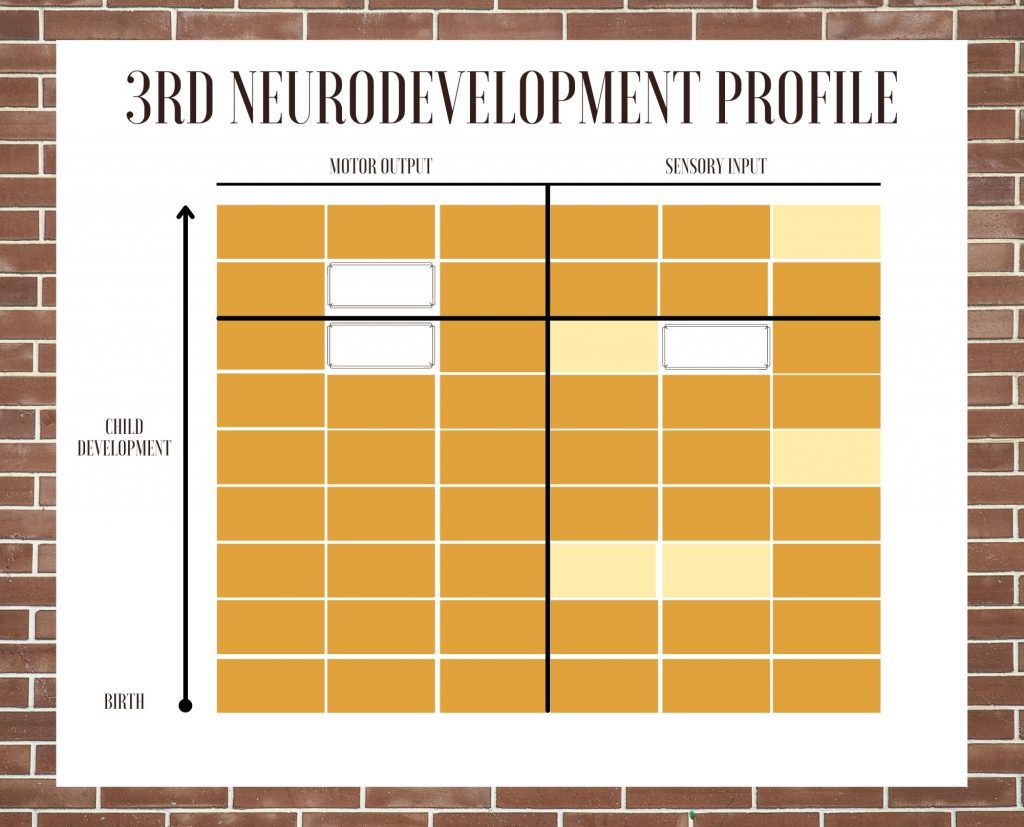
You can see that most of the blocks have been filled in. The lighter color bricks represent areas where development is almost complete! It kinda feels like a miracle!
If you think your child could benefit from a NeuroDevelopmental plan, you can schedule a free 15-minute consultation. This was very helpful for me in deciding how I could help Audrey in her journey.
Dr. Jan shares more great info on her YouTube and Rumble channels "Brain Coach Tips."
You can also talk to her in person at the THSC convention this year in Allen and The Woodlands as well as Teach Them Diligently in Roundrock.
Betsy Strauss is an unexpected homeschooler, mother of three, who is in a relationship with a sweet man for life. She loves reading books, drinking coffee, and learning anything with her kids.


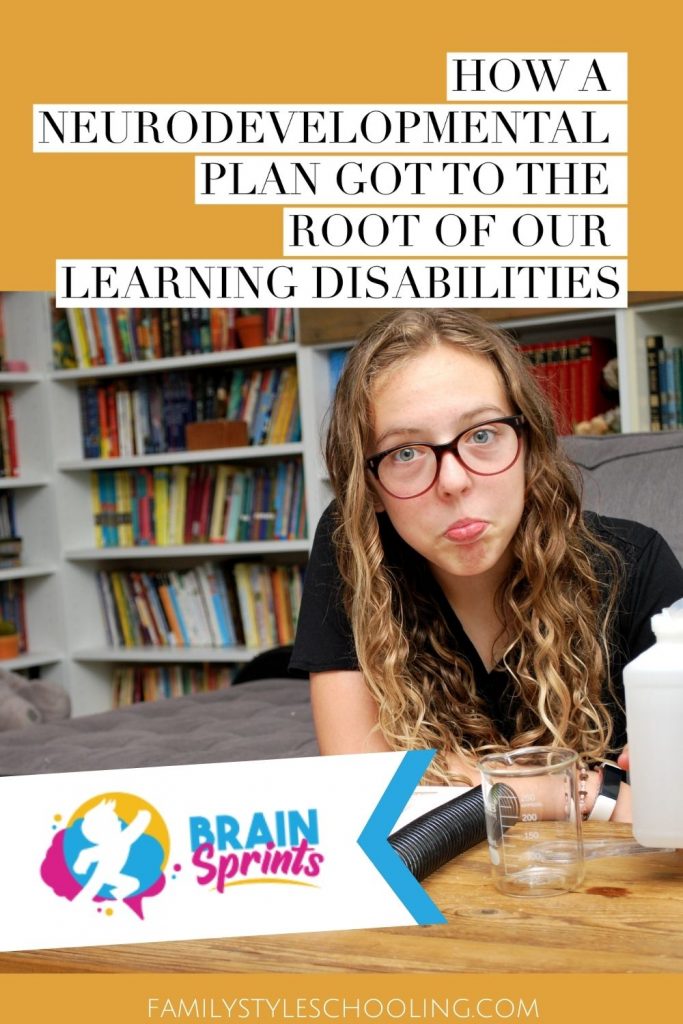

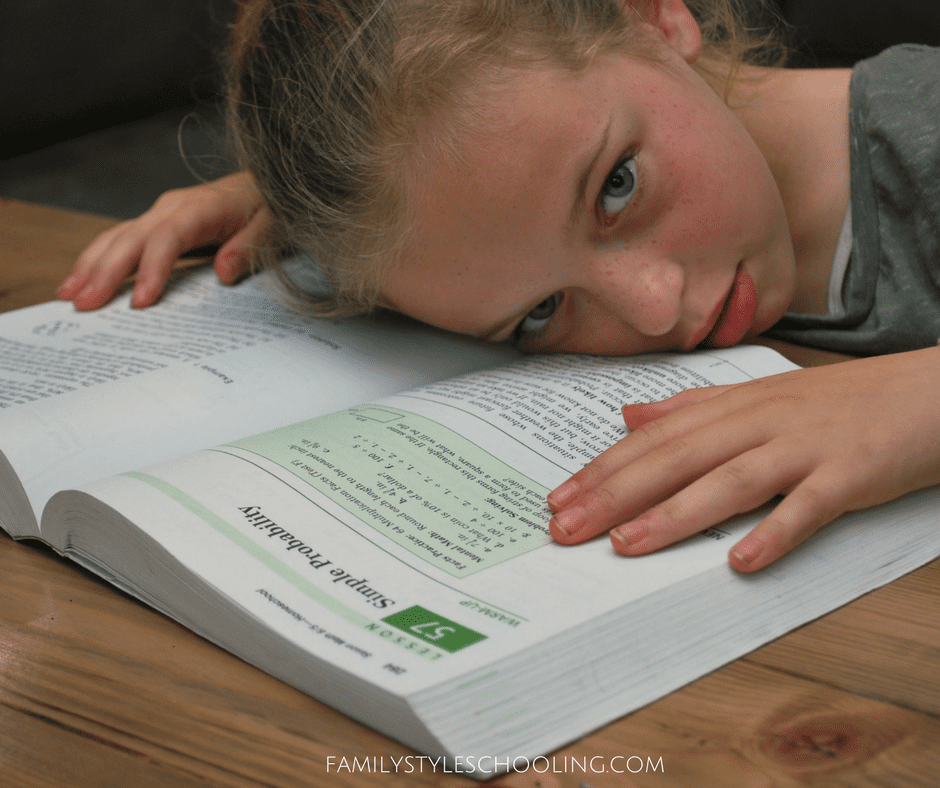
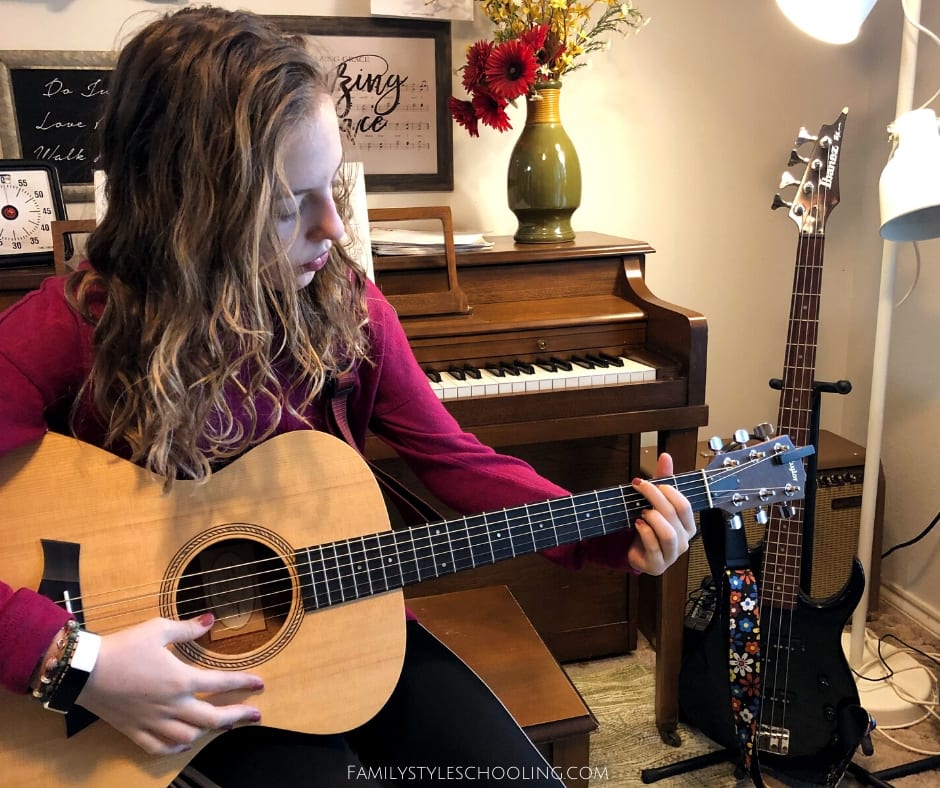

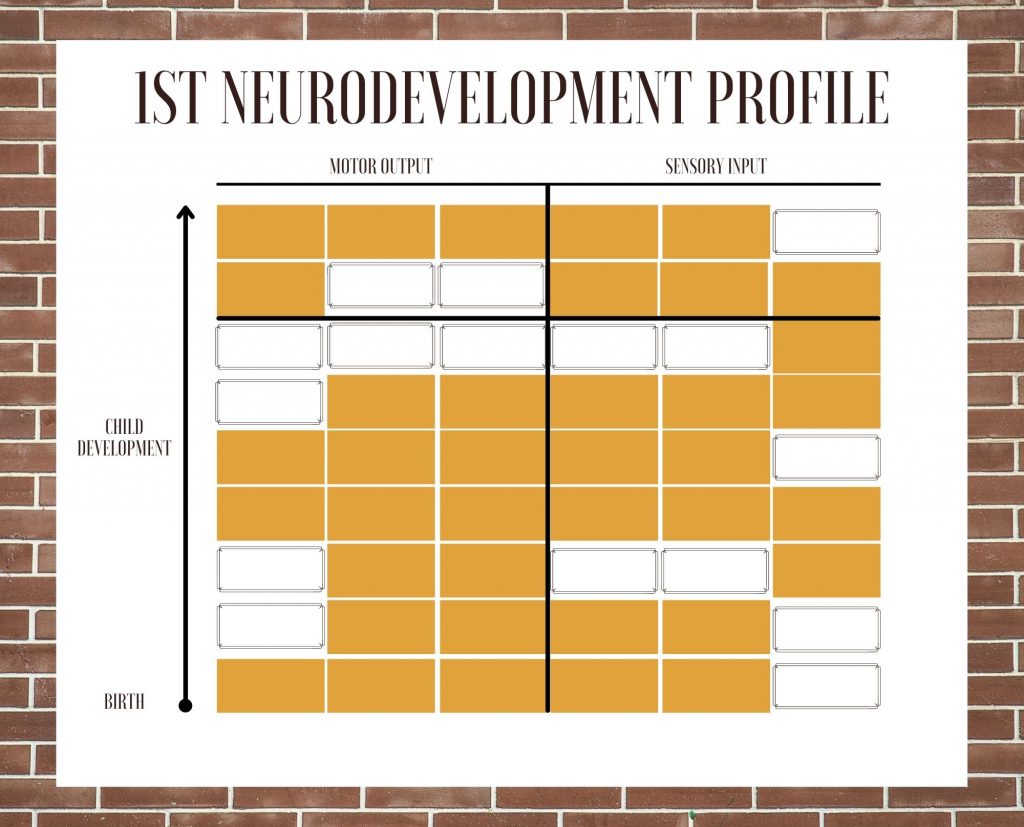
Your post is so timely! My youngest child just turned 16. He requires help in every subject.
He has been diagnosed as dyslexic, and spelling is his biggest challenge.
We have done CC from Kindergarten, however just this semester I pulled him out of Challenge 1. Not because we don’t love CC, but he still doesn’t have the basics down.
When you did this neurodevelopment, did it take much of the school day?
I’m struggling with how to do everything necessary for high school, but I feel we need a reset and a step back to shore up the basics.
Reading your blog has made me very curious about this process.
Thank you for your transparency and willingness to share your story to help others.
I totally understand! We still did CC while working on this program, but I scaled the work so we could focus on Brain Sprints. I’ll be sharing in more detail on Friday how this looked on a day-to-day basis, but basically, the program took 1.5-2.5 hours a day, and we did about four days a week. The activities themselves are short, but depending on your plan, there can be a lot of them! I am so thankful that we took the time out of her high school plan to do this because I know that she’s more prepared now to tackle the higher-level subjects. Since her brain is more organized, she’s more efficient in her work now and actually retaining what she’s learned. I’d encourage you to check it out!
Thank you for writing this blog post. My son has been going to Brain Sprints for 1 year 8 months now. He was adopted, and he definitely missed a lot of developmental milestones. Our journey is taking longer, but it is so worth it. I used at least 3 other “Brain programs,” and Brain Sprints is definitely hands down the best. I will be forwarding your articles to other friends that may need Brain Sprints. It’s nice showing them another recommendation.
We are preparing to start Challenge A in the fall, so thank you for all your helps and resources. You’re a blessing!
Thank you for sharing your experience. I love that Brain Sprints is so customized to each student’s needs and that you can take the time you need. Hope Challenge A goes well. We had to scale a lot of our daughter’s Challenge work while we did Brain Sprints to give her the space she needed. Now that we’re through the program, she’s back up to speed with the work. It was defiantly worth it!